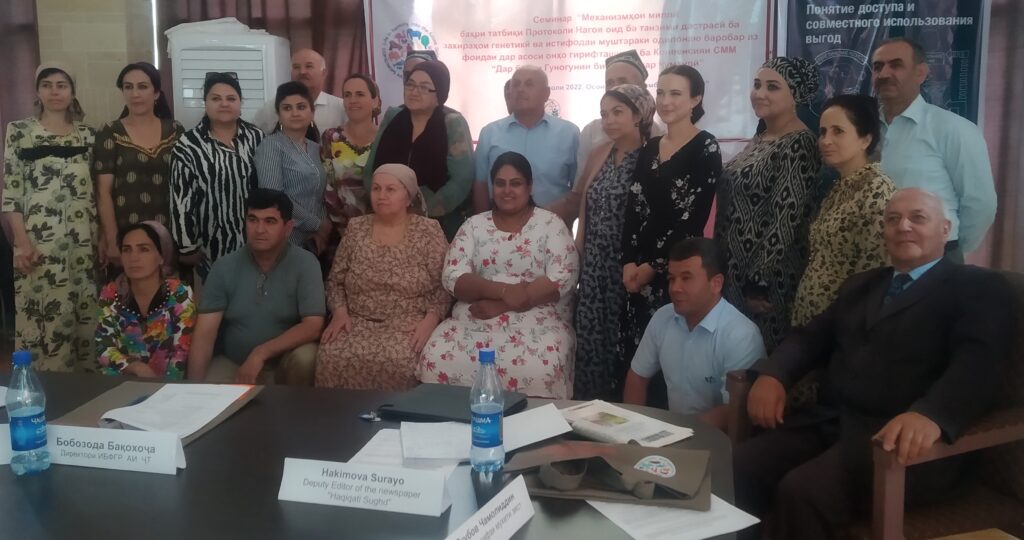On the basis of the sanatorium Shohambary (Saturn) of the city of Gissar on June 20-23, 2022. a training seminar was held on the topic: “Conservation of biodiversity and genetic resources in the light of the requirements of the Nagoya Protocol”.

The work of the seminar was opened with welcoming words by the Director of the National Center for Genetic Resources of the Tajik Academy of Agricultural Sciences (TAAS), Ph.D. Karomatov Sh. .
The workshop was attended by more than 40 scientists, specialists and farmers, invited stakeholders, including ministries, departments, public organizations, representatives of the private sector, academic and scientific organizations, including from the National Republican Center for Genetic Resources (NRCGR) of the Tajik Academy of Agricultural Sciences (TAAS ), Institute of Botany, Physiology and Genetics of Plants (IBFGR) of the National Academy of Sciences of Tajikistan (NAST), Institute of Horticulture, Viticulture and Vegetable Growing (TASKhN), Tajik Agrarian University. Sh. Shotemur, Ministry of Agriculture of the Republic of Tajikistan, National Center for Patents and Information of the Republic of Tajikistan, Customs Service under the Government of the Republic of Tajikistan and others. The main goal of the seminar was to promote, revive, preserve the biological diversity of Tajikistan, rational use of genetic resources, traditional knowledge and environmental education of young people in the future. Particular attention of the participants was directed to the development of the methodology for obtaining benefits from the sale of genetic resources based on the requirements of the Nagoya Protocol of the Convention on Biological Diversity in the conditions of the Republic of Tajikistan in the future. An international lawyer on biodiversity issues from India, Ms. Levinia Veera, was invited to the seminar and conducted the last training seminar. She spoke about international experience in the fair distribution of benefits from the use of genetic resources and traditional knowledge in the future.
The seminar noted that at present, the biological diversity of Tajikistan covers more than 23 thousand species of flora and fauna, which is about two percent of the total amount of world biological diversity on Earth, and more than 11 thousand species of flora and fauna have been collected and stored in the National Center for Genetic Resources of the Academy of Agricultural Sciences. varieties of various agricultural crops.
It should be noted that Tajikistan occupies one of the leading places in Central Asia in terms of the number of endemic forms of vegetation. At present, numerous valuable samples of local medicinal and ornamental vegetation of the republic have been collected and propagated in various research organizations of the republic (Pamir Botanical Garden, Kulyab Botanical Garden, Innovation Center for Biology and Medicine (NANT), which in natural conditions due to anthropogenic human action and change climate, they are on the verge of reduction and disappearance of their resources.The collected collection material of various forms and samples of flora is a valuable gene pool of vegetation of the Republic of Tajikistan, and representatives of a number of endemic flora of Central Asia also grow and are preserved here, as well as collected from other countries of the world.
On the main provisions and articles of the new law “On genetic resources of the Republic of Tajikistan”, which was adopted by the Parliament of the Republic of Tajikistan on March 18, 2022, No. 1865, legal expert Puladov A., candidate of legal sciences spoke.
The following speakers spoke at the seminar: Karomatov Sh., Director of the National Center for Genetic Resources (TAASHN), Candidate of Agricultural Sciences; Bobozoda B.B., Director of the Institute of Botany, Physiology and Genetics of Plants (NANT), Candidate of Biological Sciences; Mubaliyeva Sh., Head of the Herbarium Fund of the Institute of Botany, Physiology and Genetics of Plants (NANT), Candidate of Agricultural Sciences; Barotov S., Researcher, Institute of Botany, Physiology and Genetics of Plants (NANT); Saidov N., Researcher, Innovative Center for Biology and Medicine (NANT), Candidate of Biological Sciences; Kamolov N., Chief Researcher of the Institute of Horticulture, Viticulture and Vegetable Growing (TASKhN), Candidate of Agricultural Sciences; Aminova Sh., Head of NGO “Khurshed”; Saidov K., head of the NGO “Green Planet”; as well as connoisseurs of traditional knowledge and custodians of local agrobiodiversity: Karimov Kh., Sharifov F., Davlatov R., Solekhova F., Butaeva U., Rizoeva Kh., Khakimova S., researcher from the USA Katerine M. and others. The main goal of the participants’ speech was aimed at educating the younger generation, members of society and the population about the conservation of biodiversity and folk traditions in the future.
Thus, the last training seminar gave new knowledge and strengthened the concepts of local farmers, women, specialists in the conservation of agrobiodiversity, the creation of a seed bank of local samples of agricultural crops in various regions of the republic and the ways of equitable use of the benefits from the use of genetic resources and biological diversity in the future. Particular attention was paid to the preservation and reproduction of seeds of local varieties of agricultural crops that were not lost, but multiplied and their fruits adorned the dostarkhan of the hospitable Tajik people in the future, as well as traditional knowledge, national spiritual heritage and custom in the future.
Kurbonali PARTOEV – head of laboratory
genetics and plant breeding of the Institute of Botany,
Physiology and Genetics of Plants National Academy of Sciences of Tajikistan,
doctor of agricultural sciences, excellent student of the press of the Republic of Tajikistan.,
Mahmudbek ODINAEV – specialist of the NGO “Zan va Zamin” (“Woman and Earth”).